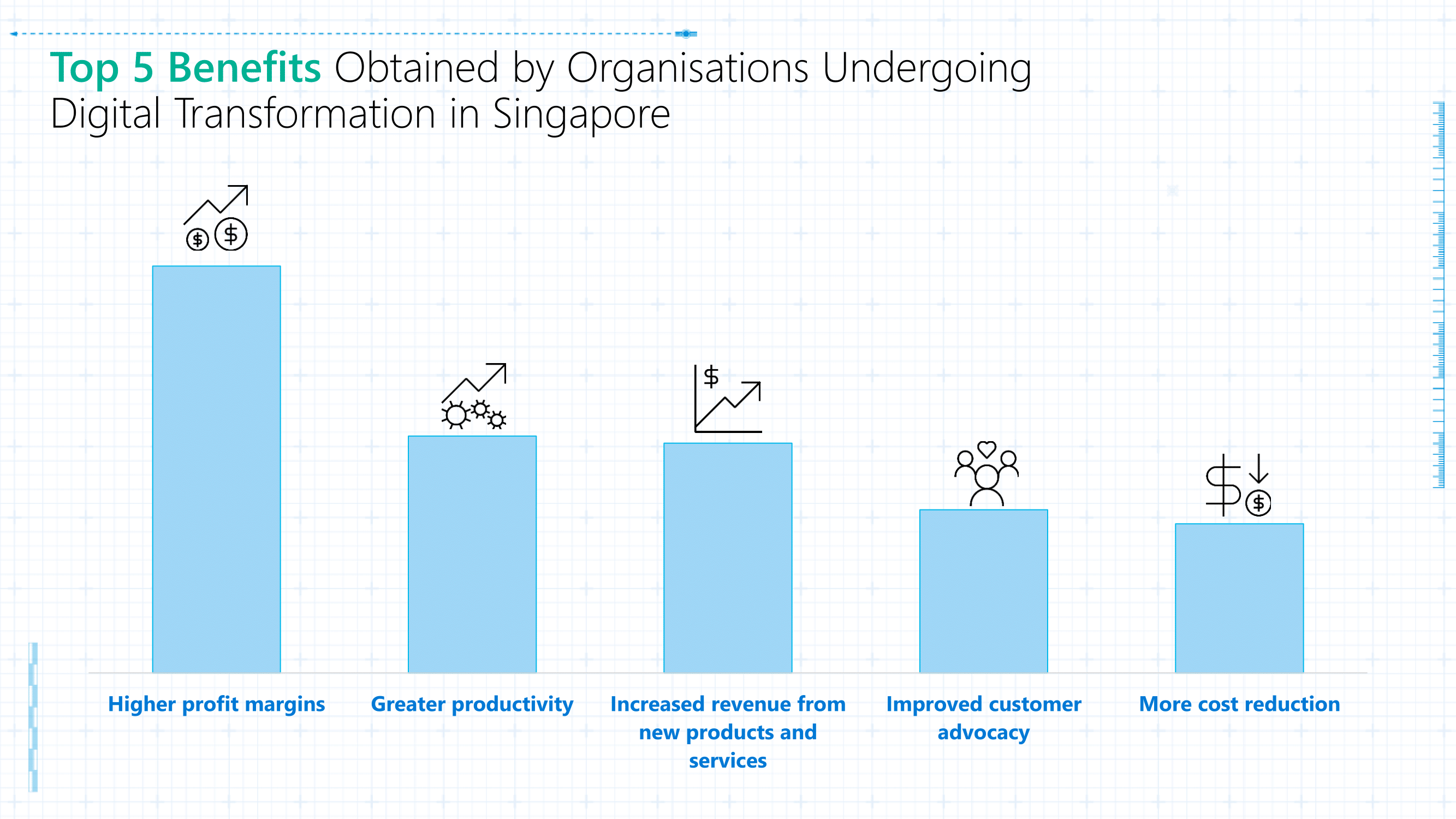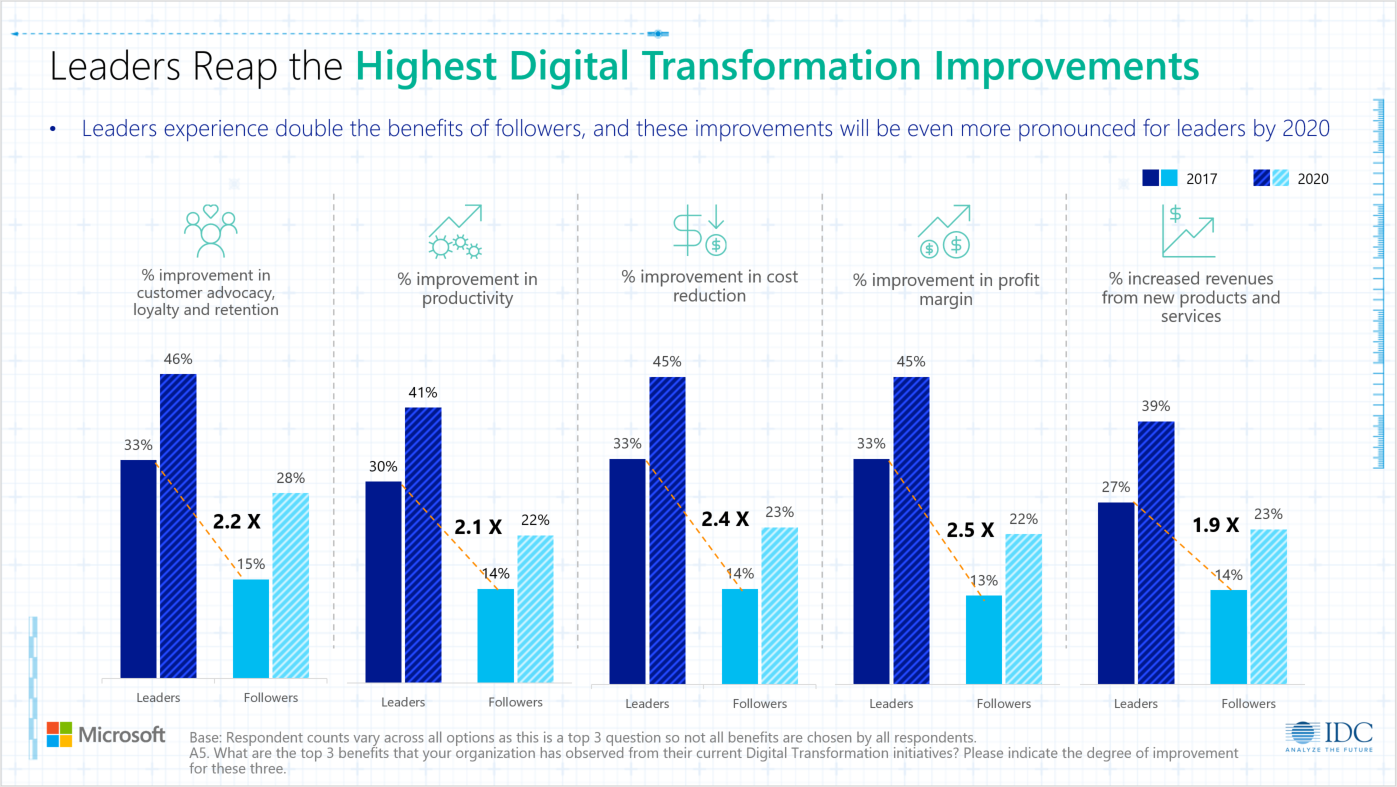Every organisation needs to accelerate their digital transformation of the business to effectively compete and stay relevant to customers. This requires changes in metrics, in organisational structures and in the technology platform that enables this transformation. While such a viewpoint may have been controversial five years ago, it is certainly not the case today as digital transformation is a key item on the agenda for C-suites, boardrooms, and even governments.
From an organisational standpoint, DBS, one of the largest banks in Southeast Asia, is perhaps one of the more vocal proponents and early adopters of digital transformation. As early as 2013, the DBS Board took the view that the future for DBS and for their industry would have to be digital. And they felt that if they didn’t lead the charge, they may “die”[1].
Race to transform
Microsoft recently partnered with the leading technology advisory firm IDC to assess the digital transformation landscape across Asia Pacific. Titled “Unlocking the Economic Impact of Digital Transformation in Asia Pacific”, the study involved some 1,560 business and IT leaders from 15 economies[2].
The study clearly showed that there will be widespread disruption to the traditional business and operations models of all organisations – approximately 60 percent of Singapore’s GDP will be derived from digital products and services by 2021, created directly through the use of technologies. In comparison, only 10 percent of our local GDP today is derived from digital products and services. This is the speed of change that all organisations must grapple with.
Organisations are also seeing significant and tangible benefits from their digital transformation efforts today. The top five digital transformation benefits that organisations experienced include increased profit margins, productivity, revenue from new products and services, customer advocacy, as well as greater cost reduction. What’s even more interesting is that these digital transformation benefits are set to grow by 40 percent more in Singapore in three years.

Winners take it all
When I speak with industry leaders, I don’t get a uniform sense of urgency about their digital transformation journeys. Some leaders prefer for others to be the trailblazers, and then to learn from these digital transformation pioneers. The question that I often ask myself is this: “Is digital transformation a race where the winner takes all?”
The study shows that the pace of transformation makes a difference, much like how an efficient pace is key in raising your chances of winning a long-distance marathon. We classified the organisations participating in the study as ‘Leaders’ and ‘Followers’ based on a few factors: the maturity of their digital transformation strategies; proportion of their digital income; and level of benefits achieved from digital transformation initiatives. With these filters applied, only 7 percent of organisations in this study can be classified as Leaders.
More importantly, the study has shown that Leaders reaped the highest digital transformation improvements – to the tune of more than double the benefits from digital transformation compared to the followers – and the effect is expected to be more pronounced by 2020.


Today, we also see Leaders placing a greater emphasis on having data as a capital asset and leveraging it to improve business decision-making, enhance products and services, as well as create new business models.
One of the companies we are working closely with is Keppel Urban Solutions (KUS). One of its lighthouse projects, the Saigon Sports City, is a 64-hectare township in District 2 of Ho Chi Minh City, Vietnam. As part of the integrated development, there will be a first-of-its-kind sports-oriented lifestyle hub, spanning across 130k sqm in land area. It is envisaged to the Vietnam’s first one-stop lifestyle hub, and will showcase KUS’ capabilities as an end-to-end master developer.

The backbone of the development is driven by smart and sustainability enablers for essential services such as security and access control, remote monitoring and control of energy and utilities infrastructure. Working with Microsoft, as well as leveraging capabilities from within the Keppel Group, SSC will deliver convenient lifestyle, transport and other value-adding services to residents and businesses.
But more importantly, KUS aims to drive sustainable urbanisation through building communities and leveraging highly connected population with the help of digital technologies. “With continuous data sensing and AI, we will be able to scale and improve our services to residents and tenants continuously, thereby achieving our vision of creating a highly liveable and digitally-connected communities that will meet the evolving needs and aspirations of a new generation of urbanites,” shared Cindy Lim, Managing Director, Keppel Urban Solutions. “Ultimately, we hope to be able to transform the traditional real estate model where we do not just have one-off relationship.”
Learnings from winners
So, what lessons can these Leaders provide? These are four recommendations for organisations to help them succeed in their own digital revolutions:
- Create a digital culture: Culture is the multi-layered core at the heart of every successful organizational digital transformation. In an increasingly digital world, a digital culture cannot thrive if an organization operates in silos with disconnected or under-connected business functions. Importantly, digital transformation will not be optimised if organisations do not collaborate with external customers and partners. The study shows that Leaders benefit most from a full digital transformation strategy in an ecosystem of customers, partners and employees working together. Data must be embraced as part of every piece of work done in an organization, where data analytics can be used to take products and services to the next level. Companies that capitalise on big data analytics will build strong foundation for emerging technologies like Artificial Intelligence (AI) and Internet of Things (IoT) to accelerate their digital transformation efforts.
- Build an information ecosystem: In a digital world, organisations have access to more data than ever before. Both the opportunity and challenge are to bring all that data together, to analyse that data, and then use it in ways that contribute to better decision making and better outcomes. Data capitalisation is key to success in the digital economy, where organisations convert data into capital assets via data sharing and collaboration internally within the organisation, as well as with customers and partners in a trusted manner. A proper data strategy that produces real and measurable data sets will also allow organisations to start taking advantage of the power of AI in identifying connections, insights and trends that are not yet obvious.
- Embrace micro-revolutions: In most cases, digital transformation efforts do not start with an organization-wide plan of change, but rather, with a series of micro-revolutions. These are small, quick wins that deliver positive business outcomes, and at the same time accrue to bigger and bolder digital transformation We see this digital momentum in Leaders, who are less risk-adverse and even often embrace both fail-fast and learn-fast approaches. This mindset will ultimately enable organisations to be at the forefront of reaping benefits from emerging technologies such as AI.
- Develop future-ready skills for individuals and organisations: Organisations today must relook at training and reskilling its workforce so that talent is equipped with future-ready skill sets such as complex problem-solving, critical thinking and creativity for the digital economy. At the same time, they need to put in processes to not only retain and attract key digital talent, but also be open to creating a flexible work-source model that lets them tap into skills-based marketplaces.
This study has shown us that in this high-stake digital transformation race, Leaders reap the greatest rewards, and will command stronger positions in the exciting digitally-fuelled world. History has also shown that during these industrial paradigm shifts, old business models often become extinct, taking out entire organisations and even industries at the same time.
If there was only one question that you should ask yourself as a business leader, it should be this: “Is your organization in a position to be a digital transformation leader today?”
You can get more insights about the Microsoft Asia Digital Transformation Study 2018 findings here.
[1] DBS Innovates Blog Post: “DBS CEO Piyush Gupta on the digital reinvention of an Asian bank”
[2] Microsoft partnered with leading IT industry analyst firm IDC to study the state of digital transformation in Asia Pacific. The “Unlocking the economic Impact of Digital Transformation in Asia Pacific” was conducted with 1,560 business and IT leaders in 15 markets, including Australia, China, Hong Kong, Indonesia, India, Japan, Korea, Malaysia, New Zealand, Philippines, Singapore, Sri Lanka, Taiwan, Thailand and Vietnam. These respondents were from medium- to large-sized organizations with more than 250 staff and above.

